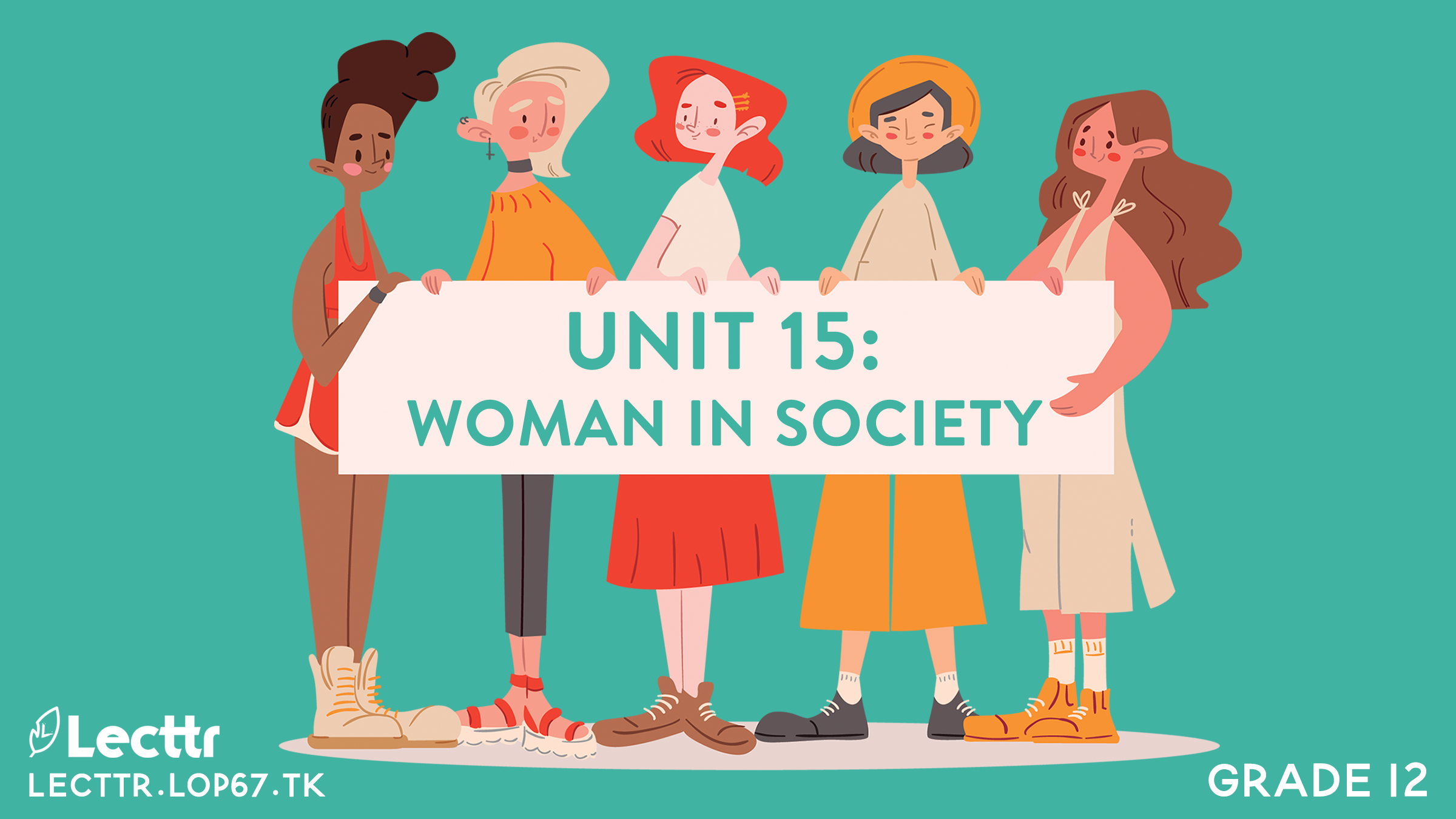Reading
Before you read
Answer these question
1. How many roles does this woman have?
– This women has two main roles. There are a wife’s role and a mother’s role.
2. Is her life typical of a Vietnamese woman’s life? Why/Why not?
– Yes, it is. Because most of Vietnamese women lead a traditional lifestyle.
While you read
Read the text on page 163, student book.
Throughout much of the history of human civilization, deep-seated cultural beliefs allowed women only limited roles in society. Many people believed that women’s natural roles were as mothers and wives. These people considered women to be better suited for childbearing and homemaking rather than for involvement in the public life of business or politics. Widespread doubt about women’s intellectual ability led most societies to deny education, employment and many legal and political rights to women. It was men who controlled most positions of employment and power in society.
The struggle for women’s rights – the rights that establish the same social, economic, and political status for women as for men – began in the 18th century during a period known as the Age of Enlightenment. During this period, political philosophers in Europe began to argue that all individuals, male or female, were born with natural rights that made them free and equal. These pioneer thinkers advocated that women should not be discriminated against on the basis of their sex.
Today, although their status varies in different countries, women in most parts of the world have gained significant legal rights. The most important of these are: the right to have equal work opportunities and pay to men, the right to vote, and the right to formal education.
Vocabulary
•civilization /ˌsɪvəlaɪˈzeɪʃn/ (n): nền văn minh Human civilization : nèn văn minh nhân loại
Ex:•deep-seated (a): sâu kín, thầm kín, vững chắc
Ex:
•childbearing (n): sự sinh đẻ
Ex:•homemaking /ˈhoʊmmeɪkɪŋ/: làm nội chợ
•intellectual /ˌɪntəˈlektʃuəl/ (adj): thuộc về tri thức
Ex:•intellectuals (n): người có tri thức
Ex: •involvement: sự tham gia •philosopher /fɪˈlɒsəfə(r)/ (n): nhà triết học •advocate /ˈædvəkeɪt/ (v) : ủng hộ •advocate /ˈædvəkət/ (n): người ủng hộ •pioneer (n): người tiên phong • pioneer (v): tiên phong Phrases: Exercise 1: Exercise 2: Vocabulary First, read the examples below then try to guess their meanings: The slaves rose and backed out of the chamber, their eyes cast down. the potential benefits of the new system She smoked and drank, neglected the children, and left the clothes unmended. Guess time: Vietnamese meanings: Additional phrases: Audio: Tapescript: Women hold up half the sky. This is an old Chinese saying. However, research shows that perhaps women do more than the share of “holding up the sky.” Fifty percent of the world’s population are women, but in nearly two-thirds of all working hours, the work is done by women. They do most of the domestic work, for example, cooking and washing clothes. Millions also work outside the home. Women hold forty percent of the world’s jobs. For this work, they earn only 40 to 60 percent as much as men, and of course they earn nothing for their domestic work. In developing countries, where three-fourths of the world’s population lives, women produce more than half of the food. In Africa, 80 percent of all agricultural work is done by Women. In parts of Africa, this is a typical day for a village woman. At 4.45 am. she gets up, washes, and eats. It lakes her half an hour to walk to the fields, and she works there until 3.00 pm. She collects firewood until 4.00 pm then comes hack home. She spends the next hour and a half preparing food to cook. Then she collects water for another hour. From 6.30 to 8.30 she cooks. Alter dinner, she spends an hour washing the dishes. She goes to bed at 9.30 pm. The rising tune: Phrasal verb: task 1+task 2:
Speaking
Listening
before you read
While you read
Language focus
Pronunciation
Grammar:
explain to
giải thích cái gì cho ai
invite to
mời ai
laugh at
cười nhạo ai, cái gì
listen to
nghe
point at
chỉ vào
glance at
nhìn lướt qua
speak to
nói chuyện với ai
throw at
ném vào ai, cái gì
stare at
nhìn chằm chằm vào ai, cái gì
write to
viết cho ai
ask for
yêu cầu ai cái gì đó
apply for sth
ứng tuyển vào vị trí nào đó
apply to sb
liên hệ với ai đó
search for sb/sth
tìm kiếm cái gì
talk about sth
nói về cái gì
talk to sb
nói với ai
discuss about
bàn về cái gì
leave for
rời để đến đâu
do for
làm cho cái gì đó
wait for
chờ đợi ai đó



No Comments
Leave a comment Cancel